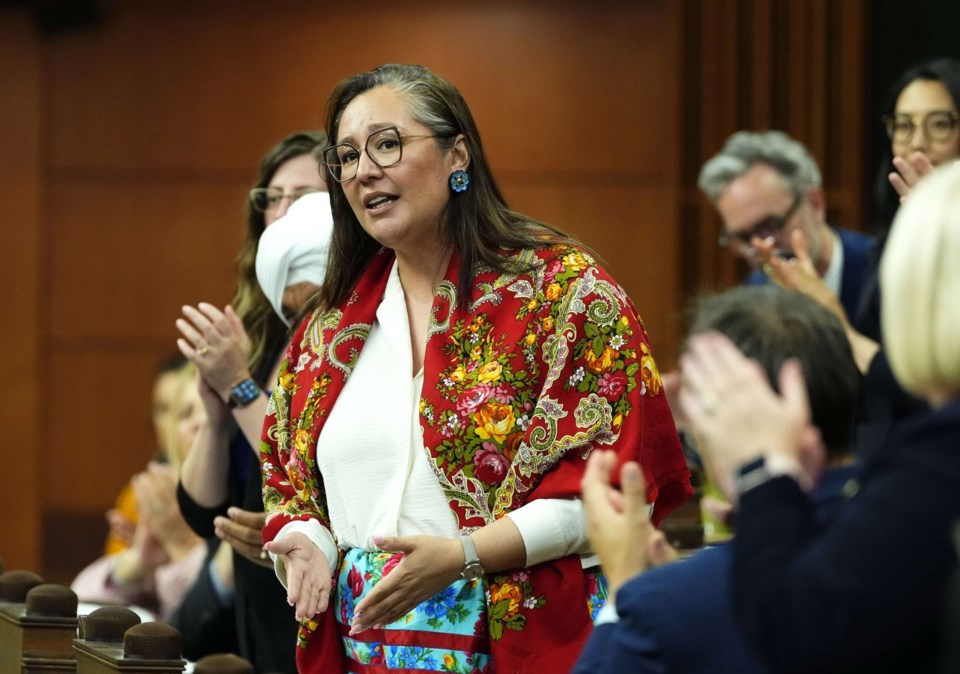OTTAWA — The federal minister of Indigenous services says her government plans to reintroduce legislation to ensure First Nations' rights to clean drinking water — despite calls from Alberta and Ontario for it to scrap the bill altogether.
Two provincial environment ministers sent a letter to their federal counterpart this week calling on Prime Minister Mark Carney's government to abandon legislation they see as undermining competitiveness and delaying project development.
"Prime Minister Mark Carney has made a commitment to do things differently," Alberta's Environment Minister Rebecca Schulz and her Ontario counterpart Todd McCarthy wrote in a June 30 letter to federal Environment Minister Julie Dabrusin.
"We are hopeful that this new federal government will move away from policies and legislation that undermine competitiveness, delay project development and disproportionately harm specific provinces and territories without any quantifiable benefits to the natural environment."
One of the bills they singled out is C-61, legislation introduced in the last Parliament that sought to ensure First Nations have access to clean drinking water and can protect fresh water sources on their territories.
That bill faced a lengthy committee process but was not passed into law before Parliament was prorogued.
In an emailed statement, a spokesperson for Indigenous Services Minister Mandy Gull-Masty said everyone in Canada should have access to clean water.
"That’s why our new government has committed to introduce and pass legislation that affirms First Nations have a human right to clean drinking water. To be clear, we intend to introduce this legislation this fall to advance this important commitment," said Livi McElrea.
"Provinces, territories, and the federal government have a shared responsibility of reconciliation with Indigenous Peoples … We call on all parliamentarians, provinces, and territories to support this critical legislation to ensure that First Nations have access to clean drinking water."
The Liberals under former prime minister Justin Trudeau vowed to end all long-term boil water advisories by 2021 — a self-imposed deadline they failed to meet.
Indigenous Services Canada data shows 37 long-term drinking water advisories are still in place across the country — most of them in Ontario.
The national chief of the Assembly of First Nations has been vocal in her desire for the bill to be reintroduced, saying after the election parliamentarians will be playing “political games” with the lives of First Nations children if it doesn't make its way back to the House of Commons.
“Every member of Parliament in Canada that’s going to sit in that House has an obligation to think about all the children of this country, and shame on people that played games, pushing it down politically, kicking it to each other and blaming each other, even through the election,” Cindy Woodhouse Nepinak said in May.
Schulz and McCarthy also pointed to the Species at Risk Act, the Greenhouse Gas Pollution Pricing Act, Clean Electricity Regulations and the Impact Assessment Act as pieces of legislation or policy that should be repealed.
Legislation to repeal the portion of the Greenhouse Gas Pollution Pricing Act that created the consumer carbon price was introduced in early June but is awaiting debate and votes in Parliament. The act will remain in place to maintain a carbon price for big industrial polluters. However the consumer carbon price was set to zero by regulation on April 1.
Both provinces have been pushing the federal government to allow for developments of major projects, often finding themselves at odds with First Nations in their respective jurisdictions.
One northern Ontario First Nation just completed a four-day demonstration that slowed down traffic on the Trans-Canada Highway to protest legislation designed to speed up mining and development, with leaders saying they feel heir rights are being violated and they are not being properly consulted in provincial and federal legislation.
Bill C-5, which became law last week, gives Ottawa the power to fast-track projects meant to boost the national economy by sidestepping most of the environmental protections and legislation Alberta and Ontario want Canada to repeal.
— With files from Liam Casey in Toronto
This report by The Canadian Press was first published July 4, 2025.
Alessia Passafiume, The Canadian Press




